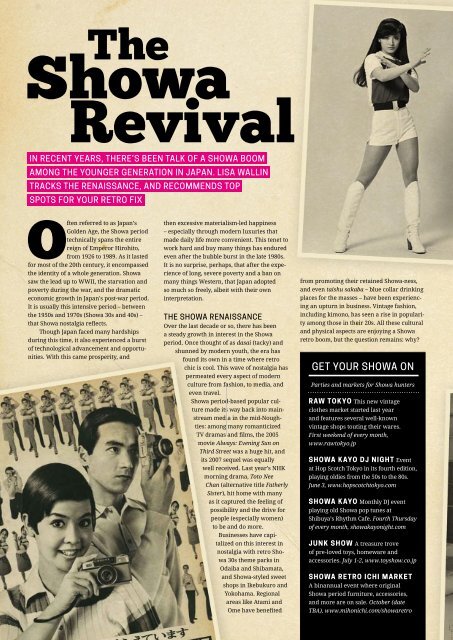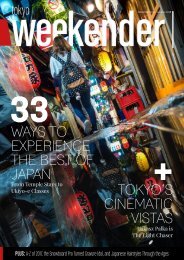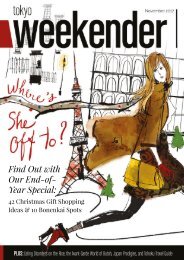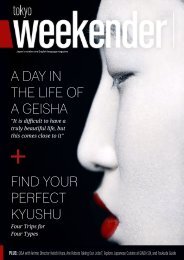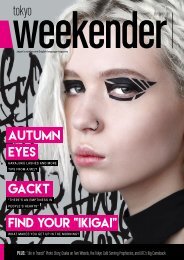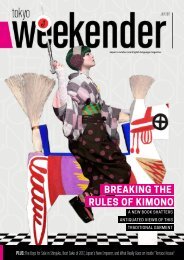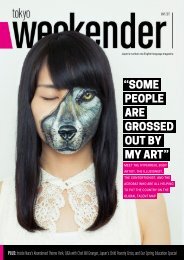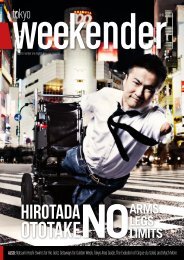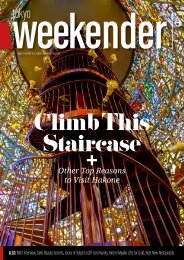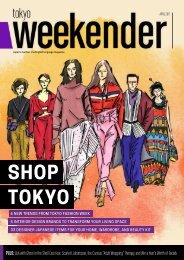Tokyo Weekender - June 2017
Tokyo’s old soul is alive and well. This month, we discover its essence in a retro shotengai, explore its renaissance in modern Japan, and find it in everyday moments on the city streets. Plus: Japan's Archaic Sex Crime Laws Are Finally Changing, Secret Gardens in Tokyo, and Is North Korea a Real Threat?
Tokyo’s old soul is alive and well. This month, we discover its essence in a retro shotengai, explore its renaissance in modern Japan, and find it in everyday moments on the city streets. Plus: Japan's Archaic Sex Crime Laws Are Finally Changing, Secret Gardens in Tokyo, and Is North Korea a Real Threat?
Create successful ePaper yourself
Turn your PDF publications into a flip-book with our unique Google optimized e-Paper software.
IN RECENT YEARS, THERE’S BEEN TALK OF A SHOWA BOOM<br />
AMONG THE YOUNGER GENERATION IN JAPAN. LISA WALLIN<br />
TRACKS THE RENAISSANCE, AND RECOMMENDS TOP<br />
SPOTS FOR YOUR RETRO FIX<br />
Often referred to as Japan’s<br />
Golden Age, the Showa period<br />
technically spans the entire<br />
reign of Emperor Hirohito,<br />
from 1926 to 1989. As it lasted<br />
for most of the 20th century, it encompassed<br />
the identity of a whole generation. Showa<br />
saw the lead up to WWII, the starvation and<br />
poverty during the war, and the dramatic<br />
economic growth in Japan's post-war period.<br />
It is usually this intensive period – between<br />
the 1950s and 1970s (Showa 30s and 40s) –<br />
that Showa nostalgia reflects.<br />
Though Japan faced many hardships<br />
during this time, it also experienced a burst<br />
of technological advancement and opportunities.<br />
With this came prosperity, and<br />
then excessive materialism-led happiness<br />
– especially through modern luxuries that<br />
made daily life more convenient. This tenet to<br />
work hard and buy many things has endured<br />
even after the bubble burst in the late 1980s.<br />
It is no surprise, perhaps, that after the experience<br />
of long, severe poverty and a ban on<br />
many things Western, that Japan adopted<br />
so much so freely, albeit with their own<br />
interpretation.<br />
THE SHOWA RENAISSANCE<br />
Over the last decade or so, there has been<br />
a steady growth in interest in the Showa<br />
period. Once thought of as dasai (tacky) and<br />
shunned by modern youth, the era has<br />
found its own in a time where retro<br />
chic is cool. This wave of nostalgia has<br />
permeated every aspect of modern<br />
culture from fashion, to media, and<br />
even travel.<br />
Showa period-based popular culture<br />
made its way back into mainstream<br />
media in the mid-Noughties:<br />
among many romanticized<br />
TV dramas and films, the 2005<br />
movie Always: Evening Sun on<br />
Third Street was a huge hit, and<br />
its 2007 sequel was equally<br />
well received. Last year’s NHK<br />
morning drama, Toto Nee<br />
Chan (alternative title Fatherly<br />
Sister), hit home with many<br />
as it captured the feeling of<br />
possibility and the drive for<br />
people (especially women)<br />
to be and do more.<br />
Businesses have capitalized<br />
on this interest in<br />
nostalgia with retro Showa<br />
30s theme parks in<br />
Odaiba and Shibamata,<br />
and Showa-styled sweet<br />
shops in Ikebukuro and<br />
Yokohama. Regional<br />
areas like Atami and<br />
Ome have benefited<br />
from promoting their retained Showa-ness,<br />
and even taishu sakaba – blue collar drinking<br />
places for the masses – have been experiencing<br />
an upturn in business. Vintage fashion,<br />
including kimono, has seen a rise in popularity<br />
among those in their 20s. All these cultural<br />
and physical aspects are enjoying a Showa<br />
retro boom, but the question remains: why?<br />
GET YOUR SHOWA ON<br />
Parties and markets for Showa hunters<br />
RAW TOKYO This new vintage<br />
clothes market started last year<br />
and features several well-known<br />
vintage shops touting their wares.<br />
First weekend of every month,<br />
www.rawtokyo.jp<br />
SHOWA KAYO DJ NIGHT Event<br />
at Hop Scotch <strong>Tokyo</strong> in its fourth edition,<br />
playing oldies from the 50s to the 80s.<br />
<strong>June</strong> 3, www.hopscotchtokyo.com<br />
SHOWA KAYO Monthly DJ event<br />
playing old Showa pop tunes at<br />
Shibuya’s Rhythm Cafe. Fourth Thursday<br />
of every month, showakayonight.com<br />
JUNK SHOW A treasure trove<br />
of pre-loved toys, homeware and<br />
accessories. July 1-2, www.toyshow.co.jp<br />
SHOWA RETRO ICHI MARKET<br />
A binannual event where original<br />
Showa period furniture, accessories,<br />
and more are on sale. October (date<br />
TBA), www.mihonichi.com/showaretro


